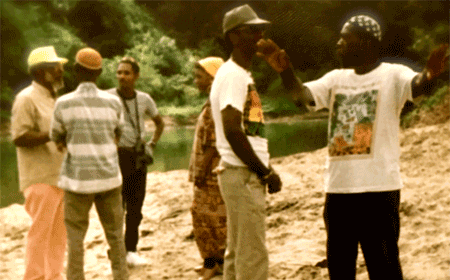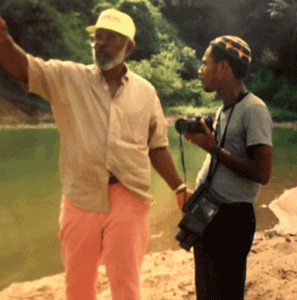NATION OF ISLAM, UBAD & MORE TOMORROW VILLAGE!
My life as a businessman and activist in Belize in the 1990s brought me around to meet for the first time in my life, the revolutionary and radical Muslim Belizean activist, Charles X Eagan, better know as “Justice”, whom for many had begun the first period of the Nation of Islam in Belize in 1961 (months before Hurricane Hattie), and started its humble beginnings in Belize City after he was deported back to Belize from the United Sates after serving prison time there.
My birth of life had just begun when he stepped back on Belizean soil again, like a kind of Belizean Malcolm X, who had embraced the Nation of Islam while in prison in the United States. The rest is history. Then Justice X’s life appeared to have followed the same path, and his return to Belize made history.
The late Ismail Omar Shabazz became Justice’s first convert in Belize to the Nation of Islam’s philosophy of “do for self and kind, live a clean life, and don’t sell your land.” The mantra became like a gospel for them and all who were associated with their spirit, as was the case with myself as a young Belizean Muslim who had begun a journey through Belizean nationalism and activism.
The stories that were relayed to me about Ibrahim Abdullah (Justice X) by Ismail Shabazz when Shabazz lived in the Los Angeles Belizean community in the 1980s, became almost a mystery trying to picture this figure of a Belizean that came home with this radical thinking that would appear almost alien to most Belizeans.
Trying to immerse myself in the time and moment of the 1960s in Belize, I wondered what the period was like with a group of black men who started to shout out in the streets of Belize City the scary words, “Freedom, justice and equality”, in a post-colonial slave society like Belize. And when the “Nation” took root in Belize City, and began pulling in others like Brother Rudolph Farrakhan, it began to create a problem for a colonial British government which was not going to have that sort of rebellion among the masses. The British began a surveillance almost urgently to put the “Nation” under check, and to contain Justice’s battle cry that gave him the name by which most Belizeans came to know him.
Then what made matters worse was that the revolutionary Justice and his converted Nation of Islam disciples joined the radical black power Belizean grassroots organization called UBAD (United Black Association for Development) that became a catalyst for change in Belize through the radical university graduate leader Evan X Hyde.
Besides the prophetic image of Justice that Brother Shabazz shared with us in L.A. in the 1980s, he also shared his Nation of Islam and UBAD positivity that attracted me immediately, with its wisdom carrying with it the liberation of self from the pangs of the wretched soul. It freed the mind. It made me feel “black and proud.”
Shabazz’s closest associate, Nuri Akbar, who was my childhood friend in Belize, had also spoken about the dynamic days of Islam in Belize in the 1970s. It became touching for me to one day meet the Muslim brother, Justice, who started it all.
My connection with Justice happened through my activist work with the grassroots Los Angeles-based Belizean organization, BREDAA, as its public relations person. Brother Shabazz had introduced me to him in Belize when we had all met up by bus at More Tomorrow, a village on the banks of the Belize Old River in the Cayo District, on our way to Belmopan to shake up the politicians in Belmopan who had been trying to take away some of the More Tomorrow land that the Nation of Islam through Justice and Shabazz had acquired since the 60s.
The representative for that area at that time, a Cabinet Minister of the ruling People’s United Party (PUP) was one Sam Waight, who had been trying to confiscate Muslim lands to give to Central American refugees who had come to Belize in a 40,000 strong influx through a United Nations program during the 1980s Price administration. Justice and Shabazz wrote the book in political charisma, and it was a joy for me to watch these two brothers work.
Brother Justice handled his business like the revolutionary he was, and by the mere roaring lion sound of his voice, the then Minister of Lands at the time, Hon. Florencio Marin, became subdued, called Justice, “My brother”, and assured him that the lands would not be taken away from the More Tomorrow Muslim land establishment.
Just that first encounter with this Belizean revolutionary called “Justice”, confirmed for me the once mysterious image of strength and honor that Brother Shabazz had painted for me. It felt good to be black and Belizean that day. Justice schooled me about being strong and to stand up for my rights regardless of who these politicians in Belize think they are.
My initial meeting with Justice (Ibrahim Abdullah) was a kind of on-the-spot initiation in activism that made me shed my shyness and exposed my spirit of power to resist. His presence made you tremble insissde, and it was not baffling to me why the Ministers of government in the Price administration in the 1990s feared his power and submitted.
Today these lands in More Tomorrow are again under attack from unscrupulous Belizean politicians because of the absence of Brother Justice and Brother Shabazz. And these lands may have already been confiscated by the present United Democratic Party (UDP) government and finally given to the emerging power of generations of Central American refugees who are displacing native-born Belizeans from their lands. If Justice and Shabazz were alive, those lands would not be touched, much less taken.
Throughout the Islamic month of Ramadan, my mind focused on this photo, it being the case that Justice came to mind for his strength he displayed as a Belizean Muslim and legendary citizen. When he left for the U.S. to seek medical attention in the late 1990s, Belize had seen the last of this giant of a man because he passed away there and was buried there. It would have been an honor for his body to have been returned to Belize, and buried in the land of his birth beside that of his comrade in the struggle, Shabazz, in More Tomorrow where this “Lion of the Jungle” fought to establish his “Freedom, justice and equality”.
He was Justice (Ibrahim Abdullah). And his spirit lives on!
(Photo through the courtesy of the BREDAA archives)


